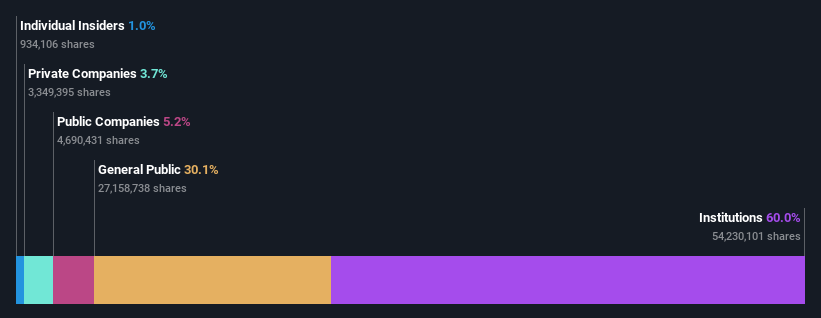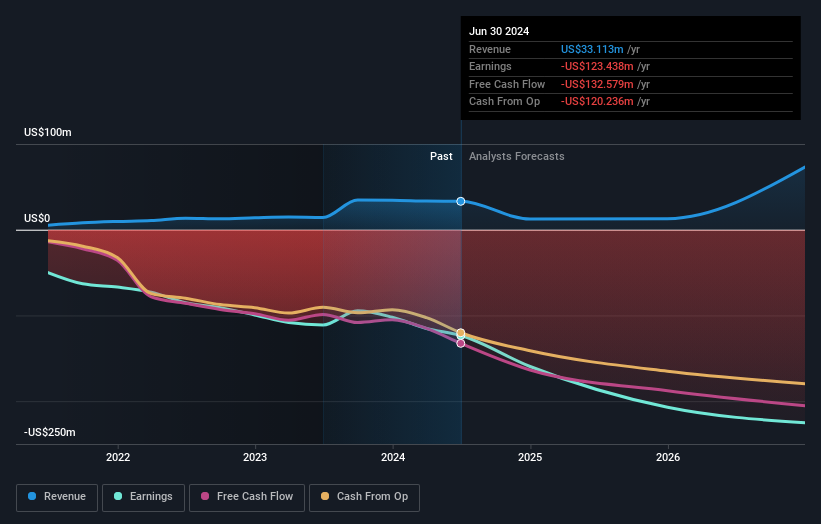Following a 49% decline over last year, recent gains may please Caribou Biosciences, Inc. (NASDAQ:CRBU) institutional owners
Key Insights
- Institutions' substantial holdings in Caribou Biosciences implies that they have significant influence over the company's share price
- 50% of the business is held by the top 16 shareholders
- Using data from analyst forecasts alongside ownership research, one can better assess the future performance of a company
Every investor in Caribou Biosciences, Inc. (NASDAQ:CRBU) should be aware of the most powerful shareholder groups. With 60% stake, institutions possess the maximum shares in the company. In other words, the group stands to gain the most (or lose the most) from their investment into the company.
After a year of 49% losses, last week’s 11% gain would be welcomed by institutional investors as a possible sign that returns might start trending higher.
Let's take a closer look to see what the different types of shareholders can tell us about Caribou Biosciences.
Check out our latest analysis for Caribou Biosciences

What Does The Institutional Ownership Tell Us About Caribou Biosciences?
Institutional investors commonly compare their own returns to the returns of a commonly followed index. So they generally do consider buying larger companies that are included in the relevant benchmark index.
As you can see, institutional investors have a fair amount of stake in Caribou Biosciences. This implies the analysts working for those institutions have looked at the stock and they like it. But just like anyone else, they could be wrong. When multiple institutions own a stock, there's always a risk that they are in a 'crowded trade'. When such a trade goes wrong, multiple parties may compete to sell stock fast. This risk is higher in a company without a history of growth. You can see Caribou Biosciences' historic earnings and revenue below, but keep in mind there's always more to the story.

Investors should note that institutions actually own more than half the company, so they can collectively wield significant power. Caribou Biosciences is not owned by hedge funds. Looking at our data, we can see that the largest shareholder is BlackRock, Inc. with 7.7% of shares outstanding. In comparison, the second and third largest shareholders hold about 5.2% and 5.0% of the stock.
After doing some more digging, we found that the top 16 have the combined ownership of 50% in the company, suggesting that no single shareholder has significant control over the company.
While it makes sense to study institutional ownership data for a company, it also makes sense to study analyst sentiments to know which way the wind is blowing. Quite a few analysts cover the stock, so you could look into forecast growth quite easily.
Insider Ownership Of Caribou Biosciences
The definition of company insiders can be subjective and does vary between jurisdictions. Our data reflects individual insiders, capturing board members at the very least. Company management run the business, but the CEO will answer to the board, even if he or she is a member of it.
Most consider insider ownership a positive because it can indicate the board is well aligned with other shareholders. However, on some occasions too much power is concentrated within this group.
We can see that insiders own shares in Caribou Biosciences, Inc.. It has a market capitalization of just US$176m, and insiders have US$1.8m worth of shares, in their own names. Some would say this shows alignment of interests between shareholders and the board, though we generally prefer to see bigger insider holdings. But it might be worth checking if those insiders have been selling.
General Public Ownership
The general public-- including retail investors -- own 30% stake in the company, and hence can't easily be ignored. While this group can't necessarily call the shots, it can certainly have a real influence on how the company is run.
Private Company Ownership
Our data indicates that Private Companies hold 3.7%, of the company's shares. It's hard to draw any conclusions from this fact alone, so its worth looking into who owns those private companies. Sometimes insiders or other related parties have an interest in shares in a public company through a separate private company.
Public Company Ownership
Public companies currently own 5.2% of Caribou Biosciences stock. This may be a strategic interest and the two companies may have related business interests. It could be that they have de-merged. This holding is probably worth investigating further.
Next Steps:
I find it very interesting to look at who exactly owns a company. But to truly gain insight, we need to consider other information, too. Case in point: We've spotted 4 warning signs for Caribou Biosciences you should be aware of, and 1 of them is potentially serious.
Ultimately the future is most important. You can access this free report on analyst forecasts for the company.
NB: Figures in this article are calculated using data from the last twelve months, which refer to the 12-month period ending on the last date of the month the financial statement is dated. This may not be consistent with full year annual report figures.
Have feedback on this article? Concerned about the content? Get in touch with us directly. Alternatively, email editorial-team (at) simplywallst.com.
This article by Simply Wall St is general in nature. We provide commentary based on historical data and analyst forecasts only using an unbiased methodology and our articles are not intended to be financial advice. It does not constitute a recommendation to buy or sell any stock, and does not take account of your objectives, or your financial situation. We aim to bring you long-term focused analysis driven by fundamental data. Note that our analysis may not factor in the latest price-sensitive company announcements or qualitative material. Simply Wall St has no position in any stocks mentioned.
 Index Options
Index Options CME Group
CME Group Nasdaq
Nasdaq Cboe
Cboe TradingView
TradingView Wall Street Journal
Wall Street Journal